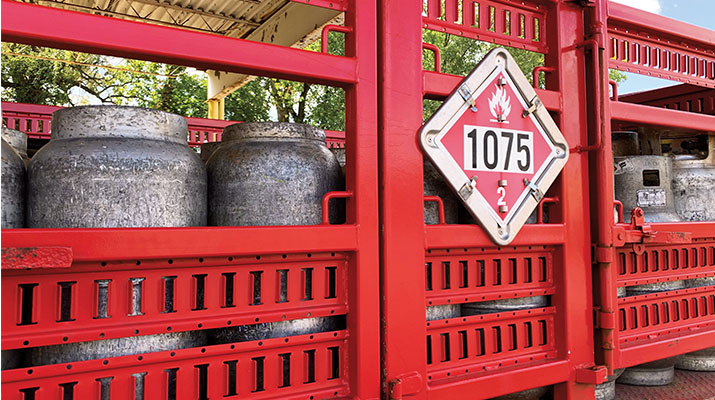10 ways to lose your insurance
Frank Thompson, president of PT Risk Management, says propane marketers run the risk of having their property and casualty insurance canceled or nonrenewed if they fail to put the insurance companies’ underwriting requirements at the top of their agenda. Here, he distinguishes 10 ways that propane marketers can lose their insurance and thereby advises on the pitfalls to avoid in their retail operations.

Thompson
1. Don’t be truthful when filling out the supplemental application. Insurance companies require a completed supplemental application for propane insurance. If your agent markets your account to multiple companies, you might need to fill out several applications. Often, these are filled out by local agents who may not fully understand the propane business.
The answers on this application guide the insurance company’s decisions, and signing it means you vouch for its accuracy. If discrepancies are found during the insurer’s initial facility inspection (typically within 60 to 90 days), your insurance could be canceled. In the event of a loss, the insurance coverage might refuse coverage due to fraud. Additionally, failing to complete the application truthfully is a major reason underwriters might decline your account.
2. Don’t comply with loss-control requirements and recommendations. When your insurance company requests a loss control visit, it’s crucial to comply and personally engage. The report will outline critical issues that must be addressed immediately to maintain coverage, alongside recommendations for longer-term improvements. Ignoring these requirements can lead to cancellation of your policy, forcing you to seek more expensive, less comprehensive coverage from non-standard insurers. Compliance with loss control measures helps protect your business, employees, customers and the propane industry’s reputation and must be documented.
3. Don’t insure your company through an agent who is well versed in propane. Few insurance companies offer specialized propane policies, and they often require agents to have specific qualifications. However, some marketers choose local or personal connections as their insurance agents, despite their lack of industry knowledge.
Over the past year, a major insurance company exited the propane market, leaving many smaller agents without options for their clients, who then struggled to secure new coverage. It’s vital to choose an agent who understands propane so you don’t have to educate them about your business.
4. Don’t streamline your business with back-office software. 2024 has been a bad year for small claims that should not have reached nuclear proportions. The propane industry is being compared with other service industries like plumbers, electricians and even auto dealerships.
When you call an electrician to come to your home, they look at the problem, pull out their tablet and give you a quote for the parts needed and the labor. At the end of the job, they take your credit card or document your check number on the tablet. The information is placed in an electronic file and stored.
Many propane companies have not made the move to modernize their record-keeping. There are numerous software companies out there with products geared specifically to propane companies that can be customized further to the specific needs of your operation. We hear time and again from the insurance companies that propane companies need to be more sophisticated with their record-keeping. Presenting a pressure test that has been scribbled on the back of a lunch bag or not being able to produce signed documents or requested invoices is not going to look good to a jury.

Carriers emphasize strong safety protocols. (Photo by LP Gas staff)
5. Don’t invest in cameras on your vehicles. Not long ago, an insured called me, thrilled about what happened. His driver was traveling through Tucson, Arizona, on Interstate 10 in a new bobtail truck when a white car maneuvered aggressively in front of him, eventually slamming on the brakes. Unable to stop in time, the truck hit the white car. Initially, the police intended to ticket the truck driver for following too closely. However, the driver provided footage from the truck’s camera, clearly showing the white car’s sudden brake with an empty road ahead. The police issued the other driver a ticket, and the insured never heard from them again.
This story can be repeated numerous times a week. Front-facing, side-facing and rear-facing cameras can save your company from a multi-million dollar claim.
6. Don’t hold regular safety meetings. As the old adage goes, practice makes perfect. Everybody needs a refresher, which is what a safety meeting is all about. Remind management, office staff, drivers and the service team that foremost we are trying to keep them safe in the office, on the road, delivering fuel and servicing the customers that we want to keep safe.
7. Take shortcuts. As I look through the loss runs from some of our insureds, I see that in numerous cases the loss was caused by human error. It’s easy to think these errors are caused by newer members of the team. In reality, tenured employees are just as likely to make the mistakes. It’s not that they don’t know how to do the job. It’s that they know how to do it so well that they know which steps in the process they can shorten or skip altogether.
Years ago, I insured a propane company founded by an older man and wife with two sons. The founder had retired after decades in the propane business, and the sons had taken over. Several years later, the old couple left home to visit some friends, and when they returned home and opened the door, they smelled propane. They headed down the basement stairs, and when he hit the light switch, the house blew up, killing them both. The fire burned the house to the ground.
Experts found that the old man (a long-time propane man) had replumbed the home multiple times and had left uncapped open lines. The moral of the story is that even with years of working with propane, we can become lax to our detriment.
There can be no shortcuts. Doing the job over and over again the right way needs to be the company’s motto.
8. Don’t join/support your local propane association. One of the first questions that every insurance carrier application asks is whether the prospective insured is a member of any propane industry associations. The insurance company knows that if the marketer is a member of the industry association(s) that they are far more up to speed on industry standards than those marketers that choose not to join. If the answer is no, it opens up a whole barrage of other questions about how the company keeps abreast of changes in codes and standards, legislative updates and more. Association executives at the state, regional and national levels work hard to protect the industry. They offer safety trainings, expert updates and safety materials to share with your customers just to name a few benefits. The costs to join are scaled based on company size and are very minimal. The benefits you’ll receive far outweigh the cost of membership.
9. Don’t proactively pay attention to your CAB (Central Analysis Bureau) score. If you haven’t looked at your company’s CAB report or Safer score, do it now. This report is a big factor that insurance companies look at when deciding whether to offer insurance to a marketer. Any violations that are incurred are included on that report and are weighted based on severity. Violations can range from a seemingly insignificant faded hazmat placard to those more dangerous such as faulty brakes, the driver not wearing a seat belt or being over on hours of service. Any violation received should be dealt with immediately and remedied as quickly as possible so there isn’t a repeat. The insurance company sees multiple violations for the same offense as a red flag that the company either isn’t properly training their drivers or that they don’t hold the safety of their fleet in high regard. A driver may not tell you that they’ve received a violation, so it’s up to you to proactively review that report at least once a quarter so you can remedy any violations.
10. Procrastinate. If the previous nine items have anything in common, it’s that all should be done with a sense of urgency. Don’t put off implementing safety procedures. If you have to cancel a safety meeting due to business needs, reschedule it promptly. Reward employees for adhering to your safety procedures. Prepare ahead of time for your loss control visits, and always set the example from the top down.
















